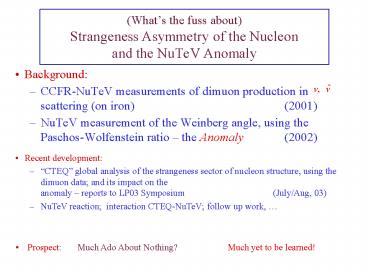Background: PowerPoint PPT Presentation
1 / 16
Title: Background:
1
(Whats the fuss about)Strangeness Asymmetry of
the Nucleon and the NuTeV Anomaly
- Background
- CCFR-NuTeV measurements of dimuon production
inscattering (on iron) (2001) - NuTeV measurement of the Weinberg angle, using
the Paschos-Wolfenstein ratio the Anomaly
(2002)
- Recent development
- CTEQ global analysis of the strangeness sector
of nucleon structure, using the dimuon data and
its impact on the anomaly reports to LP03
Symposium (July/Aug, 03) - NuTeV reaction interaction CTEQ-NuTeV follow
up work,
- Prospect
Much Ado About Nothing?
Much yet to be learned!
2
Special Acknowledgements
Fred Olness (SMU) (with the help of T. Bolton
and M. Goncherov of CCFR) preparation of the
dimuon data for global QCD analysis.
Jon Pumplin and Dan Stump (MSU)development of
the global analysis tools, and participation in
the analysis.
Kevin McFarland (Rochester)stimulating
discussions about the differences of the methods
of global analysis and experimental analysis.
3
Motivation NuTeV Anomaly
The NuTeV measurement
Use a quantity related to the Paschos-Wolfenstein
Ratio
(isoscalar target)
4
Corrections to R-
Kulagin hep-ph/0301045
NLO correction (NuTeV LO)
neutron excess
reduction
strange asymmetry
These corrections have been under closescrutiny
by many authors, in particular BPZ(Barone et.al)
and Davidson et.al.
Needs a comprehensive global QCD analysis to
clarify many of the relevant issues
5
Strangeness Structure of the Nucleon Dimuon
Production in Scattering
- Process that provides the most direct (LO)
constraints on the strangeness sector of the
parton structure of the nucleon.
(d is Cabibbo suppressed)
Modeling needed for com-paring theory with data.
6
CCFR-NuTeV Analysis of Strange Quarksand the
Weinberg Angle Measurement
- Ingredients to the CCFR-NuTeV dimuon analysis
- Data on
- Fragmentation functions
- heavy quark fragmentation
- Buras-Gaemer Para./CTEQ/GRV non-strange partons
- Strange distributions given by
- Þ Gave parameters k and a but no actual plots
of s(x,Q),
7
Strangeness Asymmetry according to NuTeV
- For implication on NuTeV anomaly, the key is the
Strangeness Asymmetry. Define
and the corresponding momentum fractions
In particular, it is S- that enters the P-W
ratio correction term.
CCFR-NuTeV claimed S-0.0027--in the opposite
direction of accounting for the anomaly.
8
CTEQ Global Analysis
- Same ingredients as CTEQ6 analysis (almost)
- Add CCFR-NuTeV dimuon data (and a few more)
- Allow a non-symmetric strangeness sector
Parametrization of the Strangeness sector (at
some QQ0)
Where x0 is to be determined by the condition
s- 0.
9
Qualitative Expectations
(really by hindsight)
Negative S- caseflipped.
10
(No Transcript)
11
What does this analysis say about the
Strangeness Asymmetry?
12
Main Conclusions of the CTEQ LP03 Reports
13
Implication on the NuTeV anomaly
14
What about the CCFR-NuTeV claim (to the
contrary)?
A picture is better than a thousand words?
15
Results on the strange sea asymmetry from BPZ
without CCFR, same asymmetry as in previous
studies
no CCFR
all data
using all data sets, the asymmetry is strongly
reduced
momentum asymmetry is compatible with zero
16
What happened after LP03?
Well, it is now 150 pm, Sept. 2. The seminar
starts in 10 minutes .

